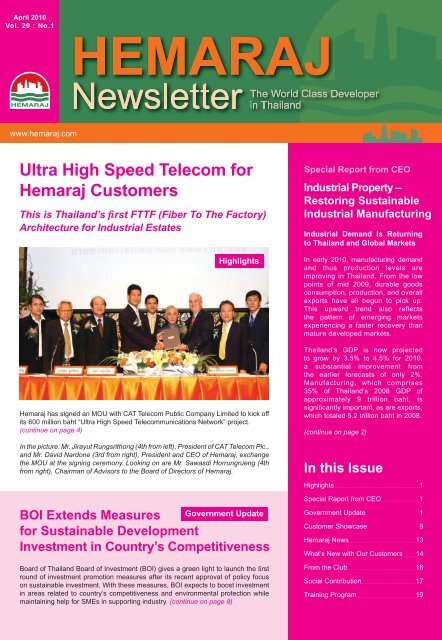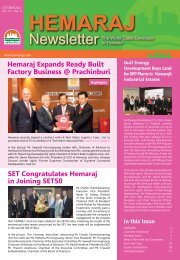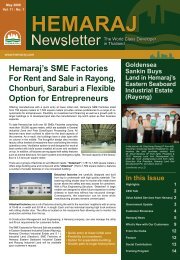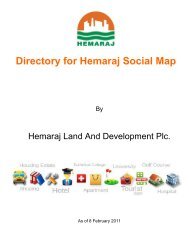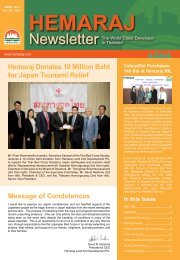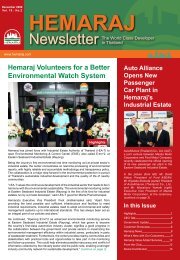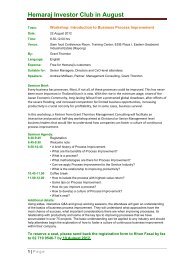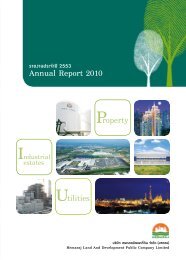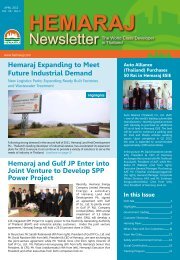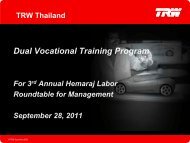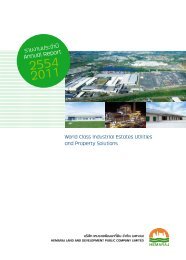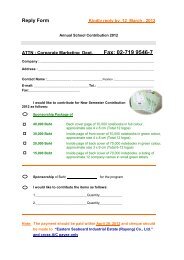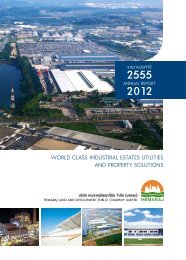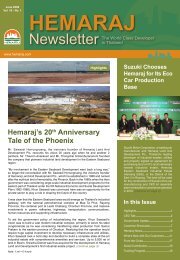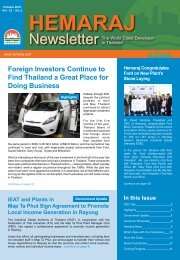Ultra High Speed Telecom for Hemaraj Customers - Hemaraj Land ...
Ultra High Speed Telecom for Hemaraj Customers - Hemaraj Land ...
Ultra High Speed Telecom for Hemaraj Customers - Hemaraj Land ...
Create successful ePaper yourself
Turn your PDF publications into a flip-book with our unique Google optimized e-Paper software.
April 2010<br />
Vol. 20 : No.1<br />
www.hemaraj.com<br />
<strong>Ultra</strong> <strong>High</strong> <strong>Speed</strong> <strong>Telecom</strong> <strong>for</strong><br />
<strong>Hemaraj</strong> <strong>Customers</strong><br />
This is Thailand’s first FTTF (Fiber To The Factory)<br />
Architecture <strong>for</strong> Industrial Estates<br />
Special Report from CEO<br />
Industrial Property –<br />
Restoring Sustainable<br />
Industrial Manufacturing<br />
Industrial Demand Is Returning<br />
to Thailand and Global Markets<br />
In early 2010, manufacturing demand<br />
and thus production levels are<br />
improving in Thailand. From the low<br />
points of mid 2009, durable goods<br />
consumption, production, and overall<br />
exports have all begun to pick up.<br />
This upward trend also reflects<br />
the pattern of emerging markets<br />
experiencing a faster recovery than<br />
mature developed markets.<br />
<strong>Hemaraj</strong> has signed an MOU with CAT <strong>Telecom</strong> Public Company Limited to kick off<br />
its 600 million baht “<strong>Ultra</strong> <strong>High</strong> <strong>Speed</strong> <strong>Telecom</strong>munications Network” project.<br />
(continue on page 4)<br />
In the picture: Mr. Jirayut Rungsrithong (4th from left), President of CAT <strong>Telecom</strong> Plc.,<br />
and Mr. David Nardone (3rd from right), President and CEO of <strong>Hemaraj</strong>, exchange<br />
the MOU at the signing ceremony. Looking on are Mr. Sawasdi Horrungrueng (4th<br />
from right), Chairman of Advisors to the Board of Directors of <strong>Hemaraj</strong>.<br />
BOI Extends Measures Government Update<br />
<strong>for</strong> Sustainable Development<br />
Investment in Country’s Competitiveness<br />
Board of Thailand Board of Investment (BOI) gives a green light to launch the fi rst<br />
round of investment promotion measures after its recent approval of policy focus<br />
on sustainable investment. With these measures, BOI expects to boost investment<br />
in areas related to country’s competitiveness and environmental protection while<br />
maintaining help <strong>for</strong> SMEs in supporting industry. (continue on page 8)<br />
Thailand’s GDP is now projected<br />
to grow by 3.5% to 4.5% <strong>for</strong> 2010,<br />
a substantial improvement from<br />
the earlier <strong>for</strong>ecasts of only 2%.<br />
Manufacturing, which comprises<br />
35% of Thailand’s 2008 GDP of<br />
approximately 9 trillion baht, is<br />
signifi cantly important, as are exports,<br />
which totaled 5.2 trillion baht in 2008.<br />
(continue on page 2)<br />
In this Issue<br />
<strong>High</strong>lights 1<br />
Special Report from CEO 1<br />
Government Update 1<br />
Customer Showcase 9<br />
<strong>Hemaraj</strong> News 13<br />
What’s New with Our <strong>Customers</strong> 14<br />
From the Club 16<br />
Social Contribution 17<br />
Training Program 19
Inquiries on <strong>Hemaraj</strong>’s products and<br />
comments on our services and newsletter<br />
can be addressed to:<br />
Corporate Marketing Department<br />
<strong>Hemaraj</strong> <strong>Land</strong> And Development Plc.<br />
18 th Floor, UM Tower, 9 Ramkhamhaeng Road,<br />
Suanluang, Bangkok 10250, Thailand<br />
Tel : (622) 719-9555, 719-9559<br />
Fax : 719-9546-7<br />
email : marketing@hemaraj.com<br />
Website : www.hemaraj.com<br />
Special Report from CEO<br />
Industrial Property - Restoring Sustainable Industrial Manufacturing<br />
(continue from page 1)<br />
Looking at leading indicators, manufacturing capacity utilization,<br />
upstream and intermediate petrochemical capacity utilization<br />
declined from the mid 90’s percentile in late 2008 to the low<br />
80’s percentile in 2009. Automotive vehicle and parts capacity<br />
utilization declined from 75% in 2008 to the mid-40s percentile in<br />
middle of 2009, refl ecting the severe local and global contraction<br />
that affected Thailand’s export base. Yet, the end of 2009 and<br />
the beginning of 2010 have seen a remarkable bounce back to<br />
near pre-crisis manufacturing capacity utilization levels.<br />
The Board of Investment 2009 fi nal investment approvals were<br />
reasonable with 1,003 projects approved and baht 281 billion<br />
baht of investment. There were a large number of applications<br />
submitted, given the expiry of special investment year incentives,<br />
which should be extended through 2010, though, given poor<br />
2009 investment conditions.<br />
Vehicle demand in 2009 was almost evenly divided between<br />
domestic sales (548,000 units) and exports (536,000 units).<br />
Total 2009 production was 999,000 units, a decrease of 28%<br />
from 1.39 million units manufactured in 2008. However, 2010<br />
has started strong with sales of 50,000 units and production<br />
of over 100,000 vehicles in January of 2010. Projections <strong>for</strong><br />
2010 are <strong>for</strong> domestic sales of 580,000-600,000 units and total<br />
production of 1.35 to 1.4 million vehicles.<br />
Automotive exports have steadily increased since the midnineties,<br />
reaching almost ten percent of Thailand’s total exports<br />
in 2008 be<strong>for</strong>e declining in 2009. Equally signifi cant is the<br />
broadening of exports from only one-ton pickups to include<br />
passenger cars as well as automotive parts, refl ecting the export<br />
supplier base <strong>for</strong> tier one suppliers. Thai vehicles and parts<br />
are exported to more than 100 countries and prospects have<br />
increased with ASEAN and other Free Trade Agreements.<br />
Map Ta Phut Negative For<br />
Investment<br />
With the current pace of legislation and procedures <strong>for</strong> Health<br />
Impact Assessments, it is hard to contemplate how any<br />
companies will receive their Environmental Health Impact<br />
Assessments (EHIA) approvals in 2010. This could mean up to<br />
a 12 to 18 month delay <strong>for</strong> dozens of projects, costing billions of<br />
dollars and affecting employment, directly and indirectly, of tens<br />
of thousands of Thai workers. It is critical, there<strong>for</strong>e, to expand<br />
and model the just announced court approved mechanism in<br />
order to enable all projects to continue with construction in<br />
parallel with the EHIA at a minimum, so that additional extensive<br />
operational, fi nancial, and supply chain losses will not be further<br />
incurred. In addition, most developed countries that have HIA<br />
assessments undertake the assessment during the operation,<br />
not prior to construction at all. This method would be fair <strong>for</strong> all<br />
the existing projects due to operate or that were operating prior to the HIA requirement and they could then undertake the EHIA in<br />
parallel if their EIA and permit are approved.<br />
2
It is necessary <strong>for</strong> the government to accept responsibility and to mitigate losses that resulted from the failure of successive<br />
governments to promulgate the necessary laws and procedures to enable investors to comply with the Constitution. This is the key<br />
to rebuilding the loss of confi dence on the part of both Thai and <strong>for</strong>eign investors. The actual situation of companies having complied<br />
with all known requirements and having obtained environmental approvals, industrial estate permits, Board of Investment promotion<br />
certifi cates, etc, and subsequently in good faith entered into contractual operational and fi nancial commitments based on those<br />
approvals was quite reasonable based on the existing legal and regulatory framework. The recent portrayal of these companies as<br />
having ignored the requirements of the Constitution and failing to take appropriate environmental action has been populist rhetoric<br />
and mostly unfair to a number of award winning environmental projects and companies.<br />
Certainly, companies would be prudent to protect their extensive capital investments by fully complying with reasonable and<br />
attainable international standards of environmental and health approvals <strong>for</strong> the well being of the environment and surrounding<br />
communities. Loading of NOX (Nitrous Oxide) and SOX (Sulfur Oxide) has been within standard in the Map Ta Phut area and, <strong>for</strong><br />
several years, companies proposing new industrial projects have been trading emission capacity reductions at existing facilities<br />
through the Environmental Impact Assessment (EIA) process.<br />
There have been VOC (Volatile Organic Chemical) emission leaks, which is an area that, in the past, had not been measured.<br />
There were also some untimely process and logistics safety failures, both during construction and operations, which need to be<br />
scrutinized, with monitoring tightened and strictly en<strong>for</strong>ced. There are a host of complex and detailed issues that explain how and<br />
why communities have been negatively impacted by industrial development and these issues need to be dramatically improved by<br />
industry and government alike, while also building increased trust, communications, planning and local community funding.<br />
There is an initial approved list of eight types of industries that require EHIA approvals although there is disagreement and debate on<br />
whether this should be nineteen or an infi nite number of projects if they contain even small amounts of chemicals. The independent<br />
committee that will render “opinions” to the approving government organization is still being <strong>for</strong>med. Thus, EHIA approvals will be<br />
slowly resolved and this further assumes the requirements and approvals are both reasonable and to international standards, and<br />
attainable by investors. So, the Map Ta Phut crisis will linger in 2010.<br />
Investment Climate Setbacks<br />
There have been numerous factors that have caused Thailand’s investment climate to deteriorate. Politics have been fractured and<br />
has left successive governments without a mandate to implement programs that will have long-term investment and infrastructure<br />
benefi ts as opposed to populist short term stimulus spending. In general, though, infrastructure in Thailand is a positive.<br />
Energy policy remains chaotic, with subsidized cooking fuel being used <strong>for</strong> vehicles and requiring the importation of LPG at a time<br />
when refi neries are operating below capacity, and natural gas <strong>for</strong> vehicles subsidized at unsustainable levels. All of which distorts<br />
the energy economics of the correct fuel choice <strong>for</strong> the consumer and the fuel model reliance <strong>for</strong> the producer as well. In addition,<br />
highway infrastructure budgets are under-funded as local roads and constituencies have received these diverted funds.<br />
Other countries are moving ahead in telecom and liberalization of services, 3G services have not been implemented yet, as these<br />
sectors have been slow to open.<br />
Policies making it more restrictive <strong>for</strong> labor practices and labor mobility as well as aggressive labor tactics have reduced Thailand’s<br />
attractiveness and directly deterred investment. Investor sentiment is further dampened by anti-<strong>for</strong>eign practices relating to home<br />
ownership, not approving permanent residency permits, and various proposed visa and work permit restrictions.<br />
In various investment climate rankings, such as the World Economic Forum, Thailand’s ranking has deteriorated to # 36 in 2009<br />
from # 28 in 2007. Supported by studies like the Doing Business 2010 by the Doing Business project at the World Bank Group, one<br />
would still conclude that overall investors fi nd more positive attributes in investing in Thailand.<br />
Restoring Industrial Growth and Competitiveness<br />
Restoring industrial growth in manufacturing and demand <strong>for</strong> developed industrial land in industrial estates <strong>for</strong> either capital or<br />
technology-intensive manufacturing has started to come back. In a 2009 mid-year survey on Japanese Foreign Direct Investment,<br />
chemicals was the most promising industrial sector cited by JBIC (Japan Bank <strong>for</strong> International Cooperation) … a ranking that would<br />
certainly be lower in the wake of the Map Ta Phut situation. Automotive, given the survey timing in the heart of the global economic<br />
downturn, dropped to a much lower ranking.<br />
However, as automotive volumes have returned and with Thailand’s ranking as the # 14 automotive producer in the world, opportunities<br />
<strong>for</strong> growth are returning and we have experienced heightened activity in this industry. Interesting has been the growth in exports of<br />
Original Equipment Manufacturers “OEMs” vehicle products and auto parts over the last ten years. Domestic auto demand has been<br />
stagnant since 1995 while 2010 sales are unlikely to reach much more than the 596,000 units sold 15 years ago.<br />
Domestic market demand is the key to Thailand’s opportunity to produce a more robust automotive product line with innovative, not<br />
detuned local-only, products as a way to increase automotive production capabilities. Much of the recent expansion by Toyota has<br />
been mainstream passenger car models. The opening of the plant expansion by Ford and Mazda in 2009 was <strong>for</strong> “B” class small<br />
vehicles, the hot selling Mazda 2 and Ford Fiesta. Other production expansions by major automotive OEMs will have much the<br />
same theme, manufacturing mainstream, mostly passenger car, products.<br />
Thailand would be better served by having the latest automotive products being af<strong>for</strong>dable locally and to export automotive parts<br />
and OEM products where possible to the 10 million production volumes in Japan, the 4 million production volumes in Korea, the 1<br />
million automotive demand in Australia, and potentially to China and to Thailand’s developed automotive export base of over 100<br />
countries today.<br />
3
The ECO car niche product being pursued by government policy will have limited success. Fuel prices in Thailand are relatively low,<br />
not prohibitive to drive purchases of very small cars unwanted by consumers. Much of the Thai population lives outside of urban<br />
areas where the 1-ton pickup will continue to be a better choice and, with low tax, diesel or subsidized fuel, not more expensive.<br />
Exports of the Thai ECO vehicle will fi nd trade barriers to importation, thus restricting production, yet exports are required to qualify<br />
<strong>for</strong> investment incentives or to even make the volumes viable. Thai OEM’s will face competition from emerging countries, such as<br />
India, that have signifi cantly higher ECO urban automotive volumes and more favorable supplier economies of scale.<br />
Opportunities <strong>for</strong> 1-ton pickups, long the Thai vehicle champion and exported to130 countries seem to have leveled off. There are<br />
other SUV and crossover SUV products in which Thailand does not have a strong production base due to restricted local demand.<br />
Countries that have strong sustainable automotive production and strong exports or potential export capabilities, e.g. U.S.A., Japan,<br />
Germany, Brazil, Mexico, Korea, China, and India, all have a common thread — a ready and competitive large local automotive<br />
market with, typically, a broad latest technological lineup of products. Thailand does not have this kind of domestic market due<br />
to high excise taxes and policies that discourage domestic consumption and, thus, will not fully develop this potential sustainable<br />
export market. This creates risks of lost future automotive investment to other growing local consumption markets, such as <strong>for</strong><br />
ASEAN Indonesia and to a lesser extent Vietnam.<br />
Industrial capacity in developed countries is now contracting and being rationalized. Thus, much of the industrial opportunity and<br />
expansion we see today is due to consolidation — including the selection of one country to use AFTA or various FTA’s to enhance<br />
export opportunities and trade, such as with Japan or Australia.<br />
Other factors increasingly relevant after the crisis are to enhance competitiveness due to cost, currency, market access, and supplier<br />
base. Thailand has a well-developed and competitive automotive supplier base. The automotive industrial clusters such as the<br />
“Detroit of the East” automotive cluster with some 137 automotive suppliers and more than 220 auto factories at our <strong>Hemaraj</strong> Eastern<br />
Seaboard Industrial Estates offer a competitive advantage.<br />
Both the private sector and government have roles in enhancing industrial productivity through increased capital investment and<br />
government incentives needed <strong>for</strong> this reinvestment. As well, streamlined standards, regulations, labor fl exibility, and capacity<br />
building will increase competitiveness.<br />
Forward thinking policies and a roadmap <strong>for</strong> energy, taxes, duties and excise are needed to enhance the local market consumption<br />
of automotive and other capital goods. Long term planning of economic and social development are required like our past experience<br />
with an active Eastern Seaboard Development Program. This would increase the predictability of policies so as not to have another<br />
Map Ta Phut setback as well as to provide the consistency and predictability needed <strong>for</strong> sustainable industrial development where<br />
communities and industry live in harmony. Manufacturing is an important sector <strong>for</strong> Thailand, representing some 35% of GDP. There<br />
are numerous environmental and industry success stories on which Thailand can build a long lasting competitive advantage with<br />
progressive policies <strong>for</strong> sustainable industrial development.<br />
David Nardone<br />
President and CEO<br />
<strong>Hemaraj</strong> <strong>Land</strong> And Development Plc.<br />
<strong>High</strong>lights<br />
<strong>Ultra</strong> <strong>High</strong> <strong>Speed</strong> <strong>Telecom</strong> <strong>for</strong> <strong>Hemaraj</strong> <strong>Customers</strong><br />
(continue from page 1)<br />
Mr. David Nardone, President and CEO of <strong>Hemaraj</strong>, said: “Our latest investment in technology development ensures a higher level of<br />
fast and effective telecom infrastructure within our industrial estates and headquarters building. This will enable <strong>Hemaraj</strong> to better serve<br />
more than 500 existing customers and prospective clients. We are very delighted to work with CAT, the national telecommunications<br />
network provider who delivers both domestic telecom solutions and access to international secured networks.”<br />
CAT is gearing up <strong>for</strong> all FTTF installations that line along main road networks within <strong>Hemaraj</strong>’s industrial estates using the<br />
Underground Air Blown Fiber System. The shift to the underground FTTF infrastructure is expected to help remove untidy cable<br />
installations on electric masts without obstructing the view within the premises.<br />
The project is divided into two phases: the FTTF infrastructure development and then the Carrier Neutral Data Center in the near<br />
future. CAT is responsible <strong>for</strong> installation and integration works, as <strong>Hemaraj</strong> provides space (in industrial estates and at UM Tower)<br />
<strong>for</strong> that purpose and manages the marketing function of the project.<br />
The network installations will start soon at Eastern Seaboard Industrial Estate (Rayong) and the adjacent <strong>Hemaraj</strong> Eastern Seaboard<br />
Industrial Estate, which are the key locations of the automotive industry in Thailand.<br />
4
Introduction of Industrial Skills Training to Schools<br />
Ms. Narisara Chavaltanpipat, Deputy<br />
Minister of Education, recently presided<br />
over an MOU signing ceremony between<br />
<strong>Hemaraj</strong>, the Offi ce of the Vocational<br />
Education Commission (VEC) and<br />
the Offi ce of the Basic Education<br />
Commission (OBEC) to launch the<br />
“Industrial Skills Training” project.<br />
The project targets students from<br />
extended schools under Chonburi<br />
Educational Service Offi ce Area 3 and<br />
Rayong Educational Service Offi ce<br />
Area 1. The objective is to equip the<br />
students with industrial skills essential<br />
<strong>for</strong> their future employment. It also<br />
aims to broaden students’ perspectives<br />
on vocational education, giving<br />
them promising career alternatives,<br />
particularly in response to requirements<br />
of the industrial sector.<br />
The project focuses on improving industrial skills by providing alternative subjects such as industrial hygiene and safety classes <strong>for</strong><br />
Mathayom 3 students, and elementary electricity classes <strong>for</strong> Mathayom 2 students. The schools in the pilot project include seven in<br />
areas around <strong>Hemaraj</strong>’s industrial estates. Four are in Chonburi Educational Service Area 3: the Baan Bowin School, Baan Hubbon<br />
School, Baan Surasak School, and Baan Khaokansong School. The three in Rayong Educational Service Area 1 are the Eastern Sugar<br />
Mill School, Baan Pakpraek School and Nikom Sang Ton Aeng, Rayong 8 School.<br />
Mr. Vivat Jiratikarnsakul, Executive Vice President of <strong>Hemaraj</strong>, also pointed out: “To address the needs of the industrial sector, the<br />
generous support and development of labor skills is really critical, as the demand <strong>for</strong> skilled labor is persistently increasing. However,<br />
school students’ interest in furthering their study in vocational fi elds is not matching the demand due to a lack of understanding.<br />
Consequently, many students aim to follow the undergrad path, despite the fact that vocational programs seem to suit their capabilities<br />
better. This collaboration is there<strong>for</strong>e destined to guide secondary school students in the basics and broaden their horizons in industrial<br />
and vocational fi elds. This will benefi t their future study and career path.”<br />
Under the MOU, <strong>Hemaraj</strong> is responsible <strong>for</strong> cooperation between Rayong Technical College, which represents VEC, Chonburi<br />
Educational Service Offi ce Area 3 and Rayong Educational Service Offi ce Area 1. Both Educational Service Offi ce Areas are directly<br />
responsible <strong>for</strong> coordination with participating schools, the course schedule, and the campaign <strong>for</strong> more participating schools, as<br />
well as monitoring of the project. Rayong Technical College will develop course outlines, curriculums and plans, provide trainers,<br />
and prepare equipment and materials as necessary <strong>for</strong> the courses to ensure the required standard. Any participating student who<br />
completes the course as specifi ed will be awarded a certifi cate, of which credits received are transferable when applying to a vocational<br />
college degree program.<br />
Previously, <strong>Hemaraj</strong> has joined hands with VEC to set up a Skills Training and Development Center at its Eastern Seaboard Industrial<br />
Estate (Rayong). The center provides the Accreditation Program <strong>for</strong> <strong>High</strong> Vocational Certifi cate, skills enhancement courses, and<br />
training as required by entrepreneurs and manufacturers.<br />
In the picture: Ms. Narisara Chavaltanpipat (center), Deputy Minister of Education, poses <strong>for</strong> a picture with Mr. Sawasdi<br />
Horrungruang (center right), Chairman of Advisors to the Board of Directors, <strong>Hemaraj</strong>, Mr. Pradit Rasitanon, (center left), VEC<br />
Deputy Secretary General, Mr. Sanae Khowto (5th from left), OBEC Deputy Secretary General, Mr. David Nardone (back row, 4th<br />
from right), <strong>Hemaraj</strong>’s President & CEO, Mr. Vivat Jiratikarnsakul (front row, 4th from right), <strong>Hemaraj</strong>’s Executive Vice President, Ms.<br />
Pattama Horrungruang (front row, 3rd from right), <strong>Hemaraj</strong>’s Senior Vice President and Chief Financial Offi cer, and other executives<br />
from <strong>Hemaraj</strong>, VEC and OBEC after the MOU signing ceremony.<br />
<strong>Hemaraj</strong> and Schools Take Big Step Forward <strong>for</strong> Holistic Learning Approach<br />
As part of the Adopt-A-School project, the “Train the Trainers” primary teachers training program<br />
encourages the betterment of education in the Eastern Seaboard.<br />
<strong>Hemaraj</strong> in collaboration with the AMCHAM Thailand Charitable Foundation (ATCF), recently held a “Holistic Learning Approach” seminar<br />
and exhibition at ESIE Plaza 1, Eastern Seaboard Industrial Estate, Rayong. Jointly presiding over the opening were Mr. Thongchai<br />
Munkong, Director of Rayong Educational Service Offi ce Area 1, and Mr. Nattaset Posrithong, Director of Chonburi Educational Service<br />
Offi ce Area 3.<br />
The event was organized to complement the “Train the Trainers” primary teachers training program. It featured six rural schools in<br />
Rayong and Chonburi participating in a pilot project under this initiative, sharing what they have learned, their progress and achievements<br />
with others in the areas.<br />
5
The “Train the Trainers” program is destined to disseminate the educational innovation and best practices<br />
of Lamplaimat Pattana School, which has been certifi ed <strong>for</strong> outstanding per<strong>for</strong>mance and praised<br />
by local and international education evaluation agencies. Launched in 2008, this training program<br />
seeks to develop teachers with skills and abilities in teaching effi ciently and getting the most out of<br />
limited educational resources. The focus of the program is on teacher ability to manage studentcentered<br />
classrooms, where students are encouraged to think and express themselves rather than<br />
memorizing and repeating traditional teacher-directed lessons.<br />
During the past two years, education administrators and primary school teachers from nearly 40<br />
schools surrounding <strong>Hemaraj</strong>’s industrial estates in Rayong and Chonburi have been taken on<br />
fi eld trips to Lamplaimat Pattana School in Buriram. They participated in a series of workshops<br />
and seminars, generating greater understanding of teaching principles and practices according<br />
to the new educational approach.<br />
The pilot project under the program has been completed successfully with six schools,<br />
including Watmapchalood School, Nikom 2 School, Banmaenumkoo School, Bannongrai<br />
School, Banphansadethnai School and Watweluwanaram School. These were chosen as pilot<br />
schools, and have translated what they learned from the training and fi eld trips into holistic teaching and<br />
learning plans, putting that into selected classrooms <strong>for</strong> a trial process.<br />
Exhibits and presentations at the<br />
seminar and exhibition include the<br />
six model schools’ project details,<br />
administration strategies, and useful<br />
experiences from the last semester.<br />
Work by students in the project was<br />
also displayed.<br />
second-year preschool and fi fth-year primary school teachers.<br />
In addition, the seminar includes<br />
demo classrooms conducted by<br />
teachers from Lamplaimat Pattana<br />
School <strong>for</strong> on-site training tailored to<br />
The event also recruited more schools into the 2010 training scheme, which will be continuously supported by <strong>Hemaraj</strong> and ATCF.<br />
Mr. David Nardone, President & CEO of <strong>Hemaraj</strong>, said: “The pilot project had an<br />
impressive result. Most participating schools are enthusiastic about continuing<br />
their participation and more schools are willing to join. For the 2010 academic year,<br />
<strong>Hemaraj</strong> will continue to work closely with Lamplaimat Pattana School to organize<br />
seminars on the holistic learning approach <strong>for</strong> 100 to 200 teachers from schools<br />
within areas around <strong>Hemaraj</strong>’s Industrial Estates in Rayong and Chonburi.”<br />
“The Lamplaimat Pattana education model is signifi cantly relevant to the 2008<br />
Education Plan launched <strong>for</strong> the fi rst time this year by the Ministry of Education,”<br />
Mr. Nardone added. “This training program is designed to be an active mechanism<br />
supporting the Ministry’s educational development ef<strong>for</strong>t. For more than a<br />
decade, <strong>Hemaraj</strong> has set itself the target of making a sustainable contribution to<br />
developing the country’s education. Our commitment is demonstrated through a<br />
range of educational and social service projects, including donations of books and school materials, school infrastructure renovations,<br />
student scholarships, and teacher training program.”<br />
Thriving Amid Chaos<br />
Against the backdrop of the global recession, continued political instability, and court-ordered delays in projects in Map Ta Phut,<br />
investors continue to fi nd Thailand a good place to do business. In fact, in a recent Grant Thornton International survey of more<br />
than 7,400 business owners in 36 countries about stress levels, Thailand ranked as the second least stressful location in Asia. This<br />
fi nding, combined with the World Bank study what ranked Thailand as the 12th easiest place to do business, may explain why <strong>for</strong>eign<br />
investors continue to choose Thailand as an investment location.<br />
In 2009, the Board of Investment received 723.4 billion baht (US$21.1 billion) in applications <strong>for</strong> investment incentives, a new record,<br />
and the trend during the fi rst two months of 2010 remained strong.<br />
Investors are bullish about the impact of Thailand’s free trade agreements (See article on page 7) and are responding to indications<br />
that global demand is picking up. Indeed, in recent months, many of Thailand’s long-time investors have expressed confi dence in<br />
Thailand. They understand that the advantages that brought them to Thailand and enabled them to be profi table, remain relatively<br />
unaffected by the political situation.<br />
For example, Unilever has indicated it will invest more than 400 million baht to upgrade its manufacturing facilities, add more<br />
production lines and increase the quality of its products.<br />
6
Germany’s Beiersdorf has invested close to 500 million to double capacity at its Nivea plant to cope with growth in exports following<br />
free-trade pacts with Asean and Australia. The capacity increase at the manufacturing facility in Samut Prakan’s Bang Phli district<br />
is aimed at cashing in on Thailand’s skilled and reliable work<strong>for</strong>ce and free-trade agreements with Asean and Australia.<br />
Ralph Gusko, Managing Director of Beiersdorf (Thailand), said that despite the economic and political situation, the decision to<br />
make Thailand its regional production hub refl ected the fact that the country is the German giant’s largest market in Southeast<br />
Asia and that it had shown constant double-digit growth. “Beiersdorf considers that we have good operations in Thailand. It is<br />
cost-competitive, the quality of production is excellent and we think it is a stable country in the long term,” he said.<br />
In terms of industries, there are several that are seeing signs of economic recovery.<br />
In the hard disk drive (HDD) sector, industry leaders Seagate and Western Digital are projecting record HDD exports in 2010,<br />
with shipments in the 650-670 million range, up some 15% from 2009.<br />
To meet rising demand in HDD and ICs, companies such as Hana Microelectronics (ICs), NXP (IC packaging), and Hutchison<br />
Technology (HDD) have all announced large-scale investments in the past year and many existing players have increase<br />
employment levels.<br />
Thailand’s auto industry is another industry that is preparing <strong>for</strong> growth, with recent estimates of a 30% increase in production in 2010.<br />
Both assemblers and parts and component manufacturers are expanding operations to enable them to meet future demand.<br />
In March, General Motors announced it was proceeding with construction of three projects in Thailand this year: a next-generation<br />
pickup truck plant, an assembly plant <strong>for</strong> pickup-derived sport utility vehicles (SUV) and a diesel engine manufacturing plant.<br />
Once these plants are complete, GM Thailand expects the country will become an export hub <strong>for</strong> pickups and SUVs with two to<br />
three times growth over the next few years. It will debut new pickups, SUVs and the mid-sized Cruze sedan by the end of this<br />
year to replace the Optra.<br />
The Thai government introduced the so-called eco-car scheme and attracted projects from 6 major assemblers, with total<br />
production set at a minimum of 675,000 vehicles per year. The fi rst of the eco-cars — the Nissan March — was unveiled in March<br />
and eco-cars from Honda, Mitsubishi, Tata, Suzuki and Toyota are in various stages of development.<br />
These are just a few examples of companies and industries that are optimistic about their futures in Thailand. Thailand’s<br />
fundamental strengths, such as cost effi ciencies, skilled work<strong>for</strong>ce in many industries, and advanced infrastructure remain in<br />
place, and the advent of the ASEAN-wide free trade area (AFTA) and other free trade agreements presents investors with the<br />
opportunity to set up a production base in Thailand from which they can service the region.<br />
The Promise of ASEAN<br />
Some three decades ago, Thailand was one of the driving <strong>for</strong>ces in pushing the Association of Southeast Asian Nations (ASEAN)<br />
to promulgate an ASEAN-wide free trade agreement. The rationale <strong>for</strong> establishing the ASEAN Free Trade Zone (AFTA) was<br />
clear — while the ASEAN members are at varying stages of developments, no single nation is as strong as the 10 countries are<br />
together.<br />
It is also clear that creation of a free trade of this magnitude (total population in excess of 580 million) makes ASEAN a <strong>for</strong>ce to<br />
be reckoned with on the global stage. Hence, creation of a single unifi ed market serves to spur intra-regional trade, create cost<br />
effi ciencies <strong>for</strong> investors who are now able to set up a production base in one country and service the entire region, and enables<br />
businesses to take advantage of the complementary nature of natural resources to lower production costs.<br />
ASEAN Population<br />
580 million<br />
ASEAN GDP<br />
US$1.5 trillion<br />
ASEAN trade US$1.7 trillion (2007)<br />
FDI in ASEAN<br />
US$60 billion<br />
ASEAN + China (CAFTA Free Trade Area) Population<br />
1.9 billion<br />
ASEAN-China Trade US$2.3 trillion (2007)<br />
On 1 January 2010, the six original ASEAN (ASEAN-6) members (Thailand, Singapore, Malaysia, Indonesia, Philippines, and Brunei)<br />
reduced import duties to zero; the so-called CLMV countries (Cambodia, Laos, Myanmar and Vietnam) will follow suit in 2015.<br />
On 1 January 2010, the China-ASEAN FTA also went into effect, reducing tariffs on goods from ASEAN-6 into China to 0.1%<br />
(from 9.8%) and goods from China seeing tariffs reduced from 12.8% to 0.6% by the ASEAN-6. By 2015, 90% of goods fl owing<br />
between CLMV and China will be free of tariff.<br />
1 January 2010 Import duties reduced to zero in Thailand, Malaysia, Indonesia, Singapore, Philippines,<br />
and Brunei on 90% of products (more than 7,800 tariff lines)<br />
1 January 2010 China reduced most of its import duties to zero as part of China-ASEAN FTA (CAFTA)<br />
1 January 2015 Import duties to be reduced to zero in Cambodia, Laos, Myanmar, and Vietnam<br />
1 January 2015 Target date <strong>for</strong> ASEAN Economic Community (AEC)<br />
7
The reduction of tariffs across ASEAN will<br />
certainly provide macroeconomic benefi t<br />
to member countries, due to enhanced<br />
intra-regional and extra-regional trade.<br />
In Thailand, as in all ASEAN countries,<br />
some industries will benefi t, while others<br />
will face new challenges and will be<br />
<strong>for</strong>ced to adapt to the changing economic<br />
environment.<br />
Among the industries that will benefi t from<br />
ASEAN are several of Thailand’s largest<br />
<strong>for</strong>eign-currency earning industries,<br />
including automotive and electronics.<br />
For example, the ability to source<br />
tariff-free parts and components<br />
across ASEAN is seen as a benefi t to<br />
automotive assemblers, as it will lower<br />
production costs, thereby making Thaimanufactured<br />
vehicles more competitive<br />
in the global marketplace. At the same<br />
time, the cost-savings can be passed on to<br />
the domestic auto market, thus providing<br />
a stimulus <strong>for</strong> domestic consumption.<br />
AFTA also offers signifi cant opportunity<br />
<strong>for</strong> Thailand’s world-class auto parts<br />
and components industry, in terms of<br />
increased intra-ASEAN exports.<br />
Tariff reductions are also good news<br />
<strong>for</strong> the electronics and electrical<br />
appliances (E&E) industry, which has<br />
long been among Thailand’s leading<br />
export industries. Thailand is generally<br />
acknowledged to be the leader in the E&E<br />
industry in ASEAN and implementation<br />
of AFTA is expected to spur new E&E<br />
investments in Thailand. Indeed, since<br />
the beginning of the year, there have been<br />
several new E&E projects announced,<br />
including Hutchinson Technology Inc,<br />
which announce a 4.3 million baht<br />
(US$130 million) HDD investment in<br />
February.<br />
In addition, ASEAN is the largest market<br />
<strong>for</strong> Thai E&E exports, accounting<br />
<strong>for</strong> roughly 17% of the total. Thai<br />
manufacturers are likely to increase<br />
their marketing ef<strong>for</strong>ts within ASEAN,<br />
and expect exports to ASEAN to grow<br />
dramatically in the short-to-medium<br />
term.<br />
In addition to automotive and E&E,<br />
textiles (especially bleached and<br />
dyed textile products) are expected to<br />
benefi t, as they see increased orders<br />
from downstream manufacturers in the<br />
less-developed ASEAN countries, and<br />
Thai agriculture and food exports are<br />
also expected to benefi t from the tariff<br />
reductions.<br />
However, the agriculture industry will<br />
also face increased competition in terms<br />
of cheaper imported goods fl ooding the<br />
market. This was already seen following<br />
the implementation of the “Early Harvest”<br />
scheme of the ASEAN-China FTA. The<br />
Thai market was flooded with cheaper<br />
agricultural goods (e.g. garlic), with<br />
Thai garlic farmers unable to compete<br />
on price. Under the AFTA, Thailand<br />
can expect to see cheaper agricultural<br />
products, especially rice, from the CLMV<br />
countries.<br />
To counter this, the Thai agriculture<br />
sector will need to upgrade production<br />
technology to increase yields and<br />
increasingly focus on higher addedvalue<br />
products to further leverage the<br />
country’s leadership position.<br />
The need to upgrade production<br />
technology and focus on added-value<br />
applies not only to the agriculture<br />
industry, but to almost every industry that<br />
is facing new competition from across<br />
the region.<br />
In the light of new competition from<br />
within the region, companies need to<br />
take a serious look at their strengths<br />
and weaknesses and respond quickly<br />
to shore up areas in which they are at a<br />
competitive disadvantage.<br />
In addition, companies need to be aware<br />
that opening up ASEAN presents threats<br />
in terms of new competitors aggressively<br />
targeting customers and the prospects of<br />
regional competitors attempting to hire<br />
staff away from you. What this means<br />
is that companies need to focus on<br />
enhancing their relationships, both with<br />
their customers and their work<strong>for</strong>ce.<br />
The bottom line is that AFTA (and<br />
CAFTA) offer real opportunities <strong>for</strong><br />
companies that are able to successfully<br />
face the light of competition, but present<br />
real challenges to companies that are<br />
unable/unwilling to adapt to the changing<br />
trade environment.<br />
Government<br />
Update<br />
BOI extends measures<br />
<strong>for</strong> sustainable<br />
development investment<br />
in country’s<br />
competitiveness<br />
(continue from page 1)<br />
Dr. Atchaka Sibunruang, BOI Secretary<br />
General, revealed after the board<br />
meeting chaired by Prime Minister<br />
Abhisit Vejjajiva, that the board<br />
approved the plan to relaunch five<br />
promotional measures that expired last<br />
year but have potential to contribute to<br />
sustainable development, enhance the<br />
country’s competitiveness in science and<br />
technology, encourage existing investors<br />
to improve quality of their manufacturing<br />
as well as reduce environmental impact.<br />
Interested investors shall submit their<br />
8<br />
applications <strong>for</strong> special investment<br />
incentives be<strong>for</strong>e December 31, 2012.<br />
New additional investment promotion<br />
measures are scheduled to be discussed<br />
the next board meeting.<br />
The measures approved by this board<br />
meeting include:<br />
1. Extended measures from Thailand<br />
Investment Year 2008-09 program <strong>for</strong><br />
3 target industries namely 1.1 activities<br />
related to energy conservation and<br />
alternative energy 1.2 activities related<br />
to manufacturing eco-friendly materials<br />
and products 1.3 activities related to<br />
high technology. Major incentives<br />
that will be granted are exemption<br />
of import duties on machinery and<br />
equipment, 8-year exemption of<br />
corporate income tax (except the<br />
projects located in Bangkok) and 50%<br />
reduction of corporate income tax <strong>for</strong><br />
five years.<br />
2. Measure to promote machinery<br />
upgrading to conserve energy or<br />
reduce environmental impacts. This<br />
measure aims to encourage companies<br />
to invest in machinery upgrade <strong>for</strong><br />
more energy effi ciency use, <strong>for</strong> use of<br />
alternative sources of energy or <strong>for</strong> less<br />
environmental impact use. Applicants<br />
must submit their machinery upgrade<br />
plan which must be implemented<br />
within three years after the promotion<br />
certifi cate is issued. Approved projects<br />
will be granted 3-year exemption of<br />
corporate income tax on the existing<br />
operation. The total amount of corporate<br />
income tax to be exempted must not<br />
exceed 70% of total value of investment<br />
in machinery upgrade.<br />
3. Measure to promote technology<br />
upgrade <strong>for</strong> manufacturing of new<br />
products. This measure aims to<br />
encourage investors to make effi cient<br />
use of their machinery as well as<br />
to be able to expand to a higher<br />
value product line while increasing<br />
revenue and maintaining employment.<br />
Qualifi ed investors must invest in<br />
upgrading the existing manufacturing<br />
line <strong>for</strong> new product(s). The product(s)<br />
manufactured from the upgraded line<br />
must be different product(s) and must be<br />
given different name from the existing<br />
product(s). Approved projects will be<br />
granted exemption of import duties<br />
on machinery, exemption of corporate<br />
income tax on new product(s) <strong>for</strong> three<br />
years regardless of zone.
4. Measure to promote environmental<br />
conservation-related investment.<br />
This measure aims to encourage<br />
factories, especially oil refi neries, gas<br />
separation, power plants, chemical and<br />
petrochemical plants, mineral and basic<br />
metal factories, to pay more attention<br />
to their environmental management.<br />
Existing companies, either BOI- or non-<br />
BOI promoted, can apply <strong>for</strong> these special<br />
investment incentives on the condition<br />
that environmental-conservation plan<br />
must be completely implemented within<br />
three years after the promotion certifi cate<br />
is issued. Approved projects will be<br />
granted exemption of import duties on<br />
machinery and equipment, exemption of<br />
corporate income tax <strong>for</strong> a period of 3<br />
years totaling up to 70% of investment in<br />
reducing impacts on environment.<br />
5. Exemption of import duties on raw<br />
materials or the benefi ts according<br />
to Article 36 (1) and (2) <strong>for</strong> existing<br />
companies. This measure aims to help<br />
ease manufacturers’ tax burden, bank<br />
assurance fees, raw material import duty<br />
interest, etc. Four supporting industries<br />
eligible <strong>for</strong> this incentive are manufacture<br />
of automobile parts, manufacture<br />
of plastic products or plastic coated<br />
products, manufacture of electronics<br />
and electrical parts and manufacture<br />
of electrical appliances and parts. BOI<br />
will grant one-year exemption of import<br />
duties on raw materials used in the<br />
manufacture <strong>for</strong> export.<br />
BOI, in addition, is working on new<br />
measures <strong>for</strong> sustainable investment<br />
which are inclusive of four measures:<br />
1) measures to develop human<br />
resource that contribute to knowledgebased<br />
industries 2) measures to<br />
build competitiveness in science and<br />
technology 3) measures to promote<br />
environmental- and community-friendly<br />
investment 4) measures to build industry<br />
and services on cultural uniqueness and<br />
creativity.<br />
BOI-Promoted Firms<br />
that List on SET or MAI<br />
to Receive Extra Tax<br />
Privileges<br />
The Thailand Board of Investment (BOI)<br />
has approved a policy change that<br />
raises the ceiling <strong>for</strong> tax exemptions on<br />
promoted projects if companies list on<br />
the Stock Exchange of Thailand (SET)<br />
or the Market <strong>for</strong> Alternative Investment<br />
(MAI).<br />
Under the new privileges, as regards<br />
BOI announcement No. 7/2552,<br />
those companies with unexpired tax<br />
exemptions granted by the Board may<br />
seek to have the cap on their corporate<br />
income tax exemption lifted <strong>for</strong> the<br />
remainder of the promotion period.<br />
However, the companies must apply <strong>for</strong><br />
this within 2012.<br />
Although fi rms that are already listed<br />
on SET or MAI are not allowed to apply<br />
under this campaign, their subsidiaries<br />
or associated companies may seek to<br />
be listed on SET or MAI to receive the<br />
privileges.<br />
This campaign will stimulate potential<br />
businesses, raise profitability, and<br />
encourage companies to list. Targeted<br />
sectors include agriculture and food,<br />
light industries with low investment but<br />
high profi tability, and heavy industries<br />
that need to raise funds domestically.<br />
Star Microelectronics (Thailand) Pcl, a<br />
leader in electronics manufacturing and<br />
services, has become the fi rst company<br />
to enjoy the tax holiday with no limit on<br />
profi ts under this campaign.<br />
In 2009, and continuing into early 2010,<br />
SET and the BOI promoted this campaign<br />
to reach potential listings by conducting<br />
roadshows nationwide, including in<br />
Sumutsakorn, Chonburi, Ayutthaya and<br />
Chiagmai. After the roadshows, SET<br />
and BOI received positive responses<br />
from many companies to apply <strong>for</strong> the<br />
extra tax benefi t.<br />
SET strongly encourages companies<br />
with BOI certificates or non-BOI<br />
privileges to explore this campaign and<br />
start preparing <strong>for</strong> listing. Doing so would<br />
give the fi rms tax savings and strengthen<br />
their business competitiveness.<br />
For more in<strong>for</strong>mation on this BOI<br />
benefi t, the listing preparations, and<br />
the 2010 SET and BOI roadshow<br />
timetable, please contact SET directly<br />
via phone at 02-229-2029 or 02-229-2033<br />
and by e-mail to panya@set.or.th or<br />
aunchalee@set.or.th.<br />
Customer Showcase<br />
Precision Valve<br />
Thailand<br />
Aerosol Leader on Way To 4<br />
Million Units a Year<br />
With an impressive heritage of many<br />
fi rsts, Precision Valve Thailand Ltd.<br />
remains at the <strong>for</strong>efront of the aerosol<br />
industry. Located in Eastern Seaboard<br />
Industrial Estate (Rayong), the<br />
company is a subsidiary of New Yorkbased<br />
Precision Global, which patented<br />
the world’s fi rst aerosol valve in 1949.<br />
Precision also developed industry<br />
standards such as the under-the-cup<br />
fi lling machine in 1958 and the totalrelease<br />
actuator in 1977, and even saw<br />
the Pepsi Space Cans with its precision<br />
dispensing system blast off on the<br />
Challenger shuttle in the 1980s.<br />
“We are an innovative company, always<br />
with something in the pipeline,” said<br />
Mr. Andrew Sims, General Manager of<br />
Precision Valve Thailand.<br />
The global market leader <strong>for</strong> more<br />
than half a century, Precision has<br />
operations in the Americas, Europe and<br />
Asia, delivering one-third of the world’s<br />
aerosol valves. With 120 employees and<br />
25,000sqm of space, the corporation’s<br />
Rayong facility commenced production<br />
in January 2007.<br />
The factory supplies valves to every<br />
element of the aerosol industry,<br />
currently producing 300 million units a<br />
year, exporting 70% of that output. The<br />
customer list includes aerosol fi lling<br />
giants Unilever, P & G, Beiersdorf<br />
and SC Johnson. The company’s<br />
products are used in the personal<br />
care, household and industrial sectors,<br />
everything from deodorants and hair<br />
mousse to air fresheners and spray<br />
paint.<br />
9
When looking to relocate its Singapore<br />
plant as part of down-costing, the<br />
company selected Eastern Seaboard<br />
as the best spot <strong>for</strong> several reasons.<br />
At the time, Precision Global was<br />
operating a small workshop in Bangkok<br />
to do fi nishing on the partially built<br />
valves from Singapore, so that helped<br />
make Thailand attractive with a level<br />
of expertise already in place here. The<br />
country also seemed to be the right<br />
choice because 30% of exports from<br />
Singapore were <strong>for</strong> the Thai market.<br />
Since commencing full operations in<br />
2007, Precision Valve Thailand has seen<br />
a steady increase in volume demand.<br />
This can be partially attributed to several<br />
European brands having moved to lowcost<br />
manufacturing bases in Asia. “More<br />
importantly, the aerosol industry in<br />
Thailand is now recognized as a regional<br />
hub <strong>for</strong> aerosol product manufacturing,”<br />
Mr. Sims said.<br />
He added that the establishment of<br />
the Thai Aerosol Association three<br />
years ago has spurred investment from<br />
<strong>for</strong>eign companies doing aerosol fi lling<br />
in Thailand. The skills base is growing<br />
and the country’s aerosol industry<br />
infrastructure is strong. Producers of<br />
everything from plastic components and<br />
valves to chemicals and aerosol gases<br />
have moved here. “There is a readymade<br />
aerosol industry here,” the General<br />
Manager added.<br />
The company has even enjoyed growth<br />
during the global economic downturn of<br />
the past two years, picking up business<br />
from European aerosol companies that<br />
moved their factories to Thailand and<br />
elsewhere in Asia to cut costs. In fact,<br />
January and February this year were its<br />
biggest volume months ever in Thailand.<br />
One new customer in particular boosted<br />
the plant’s volume by 15%.<br />
With three assembly lines running 24<br />
hours a day, the company is almost at full<br />
capacity. A fourth assembly line will go<br />
on-stream in coming months, boosting<br />
annual capacity to 400 million valves.<br />
The General Manager was quick to<br />
respond as to the company’s competitive<br />
edge. “We are renowned <strong>for</strong> our quality,”<br />
Mr. Sims said. Precision Valve Thailand<br />
employs the Six Sigma businessmanagement<br />
strategy <strong>for</strong> ensuring<br />
quality, and has GMP, ISO 9001:2000<br />
and ISO 14001:2004 certifi cation on<br />
its manufacture and environmental<br />
practices.<br />
“Another competitive advantage is<br />
that we are very responsive to our<br />
customers,” he noted.<br />
Precision Valve Thailand also cares about<br />
local needs. To give back to Thailand,<br />
the company operates a CSR program<br />
under which it supports needy causes in<br />
10<br />
local communities. A recent social-care<br />
example involved gift-giving and hosting<br />
a dinner <strong>for</strong> underprivileged children.<br />
Precision Valve Thailand looked at<br />
various sites in the country be<strong>for</strong>e<br />
deciding on Eastern Seaboard Industrial<br />
Estate (Rayong). “We wanted a worldclass<br />
facility and <strong>Hemaraj</strong> ticked all the<br />
right boxes,” said Mr. Sims.<br />
The Rayong estate met the company’s<br />
requirements <strong>for</strong> uninterrupted power<br />
and water services, security, and good<br />
road infrastructure. “On top of that, there<br />
is an established engineering industry<br />
in the area <strong>for</strong> support in making parts,<br />
the labor pool here is excellent, and we<br />
have proximity to the deep-water port <strong>for</strong><br />
shipping on a daily basis,” he added.<br />
Contact in<strong>for</strong>mation:<br />
Ms. Charuwan Amornthanomchoke<br />
Commercial Manager<br />
Tel: +66 026344322<br />
E-mail: charuwan.amornthanomchoke@<br />
precisionglobal.com<br />
Visy Packaging<br />
(Thailand) Limited<br />
Plastic Cup Maker. Keeps It<br />
Clean<br />
Boasting a truly clean manufacturing<br />
process, Visy Packaging (Thailand)<br />
Limited is doing wonders <strong>for</strong> the image<br />
of plastics production. Using stateof-the-art<br />
systems, the company’s<br />
specialized factory makes thermo<strong>for</strong>med<br />
barrier plastic cups at <strong>Hemaraj</strong> Eastern<br />
Seaboard Industrial Estate, Visy supplies<br />
multinationals such as Dole, Coca-Cola<br />
and Heinz.<br />
The plant opened in October 2009, and<br />
80% of its many customers are in the<br />
food industry. More than two-thirds of<br />
output is sold to clients in Thailand, with<br />
exports going mainly to the USA and<br />
China market.<br />
Production at the Rayong plant is fully<br />
automated, an impressive operation of<br />
sensory cameras and precision robots.<br />
“This is the most advanced factory in the<br />
world <strong>for</strong> our sector,” General Manager<br />
Mr. Simon Shale said proudly. “We have<br />
simplifi ed the making of plastic products,<br />
changing it from a black art.”<br />
Once the line is set up, the machines run<br />
themselves. Staff only has to put a roll of<br />
polypropylene back on every hour or so,<br />
and check now and then to make sure<br />
things are going along smoothly.<br />
Processes include extruding plastic in<br />
up to 13 layers. The plant’s world-class<br />
thermo<strong>for</strong>ming machines produce more<br />
than 1,200 cups a minute, or 1.2 billion<br />
pieces a year. “We have exclusivity on<br />
our technology,” Mr. Shale said. “It’s<br />
pretty amazing.”<br />
In addition to being ultra-high-tech,<br />
the factory is fully air-conditioned to<br />
help ensure there is no contamination.<br />
It follows strictly the HACCP (Hazard<br />
Analysis & Critical Control Points)<br />
food-safety management system <strong>for</strong><br />
elimination of any biological or chemical<br />
risk from improper materials, production<br />
or handling. “I can guarantee customers<br />
that our cups are untouched cups. Others<br />
will take things off the line manually, but<br />
this plant is all automated,” the general<br />
manager noted.<br />
With virtually zero waste, as the<br />
processes work the scrap back into the<br />
material used, the factory is also very<br />
environmentally sound.<br />
The plant uses Australian technology.<br />
The R&D work, as well, is done in<br />
Australia, with the focus currently on<br />
extending the per<strong>for</strong>mance of the plastic<br />
cup.<br />
The company is a subsidiary of<br />
Melbourne-based Visy Industries<br />
Holdings Pty Ltd., which was founded in<br />
1948 and today has 5,000 employees.<br />
The privately owned corporation is a<br />
world leader in packaging and recycling,<br />
with units in paper, cardboard, plastics,<br />
glass and metals. It also designs robotic<br />
systems. Operations extend from<br />
Australia to Asia, Europe and North<br />
America.<br />
Many factors were behind the decision<br />
to locate in Thailand. Perhaps the<br />
biggest reason was to be closer to deep<br />
seaport and its main customer, fruit giant<br />
Dole Thailand, which it was servicing<br />
previously from Australia.<br />
Besides being the food basket of Asia,<br />
Thailand is also what Mr. Shale calls<br />
the region’s “safest entry destination<br />
<strong>for</strong> investment.” Part of this is the<br />
attractive combination of low-cost but<br />
skilled labor in the country. <strong>Hemaraj</strong><br />
played a role as well, meeting the
company’s requirement <strong>for</strong> a rental<br />
facility at fi rst, with an option to buy<br />
later, as a means of minimizing<br />
initial capital. Operating in <strong>Hemaraj</strong><br />
Eastern Seaboard Industrial Estate<br />
(Rayong) also provides proximity to<br />
the Laemchabang deep-water port <strong>for</strong><br />
shipping easily to Australia, China and<br />
around the world. Moreover, the estate<br />
gives the company quick access to<br />
raw materials such as polymers and<br />
plastics in nearby Map Ta Phut.<br />
All of this makes good business sense,<br />
as such savings enable Visy Packaging<br />
(Thailand) to pour more funds into<br />
technology, automation and innovation.<br />
This in turn results in better products<br />
and services <strong>for</strong> customers. “We<br />
become more profi table by making our<br />
customers more profi table,” Mr. Shale<br />
said.<br />
The company also believes it has a<br />
responsibility to help local society.<br />
Besides providing top-end salaries and<br />
advanced skills training to Thai workers,<br />
it is active in CSR programs. Recent<br />
examples include sponsoring a wall<br />
construction at a near by temple and<br />
visiting schools to deliver contributions<br />
of goods. “There is an opportunity here<br />
<strong>for</strong> philanthropy and we can help,” the<br />
General Manager said.<br />
Steady growth is <strong>for</strong>eseen <strong>for</strong> the<br />
Thailand plant. “Visy is aware that Asia<br />
is calling. We will be investing more<br />
and more. In fact, we have rights from<br />
<strong>Hemaraj</strong> to quadruple our size here.”<br />
Mr. Shale remarked.<br />
To maintain its edge, Visy Packaging<br />
(Thailand) will be pursuing the right<br />
times and the right penetration routes<br />
<strong>for</strong> potential new products and services.<br />
But the biggest factor in any expansion<br />
decisions will be how customers can<br />
benefi t from them.<br />
Mr. Shale pointed to quality and<br />
innovation as two of Visy’s competitive<br />
advantages. Another is certainly longterm<br />
sustainability, as the corporation has<br />
been meeting the needs of customers<br />
<strong>for</strong> more than 60 years.<br />
Contact in<strong>for</strong>mation:<br />
Mr. Simon Shale<br />
General Manager<br />
Visy Packaging (Thailand) Limited<br />
Tel: 033 000 211<br />
E-mail: shale@vist.com.au<br />
Logistics Alliance<br />
(Thailand) Co., Ltd.<br />
Leads Distribution of<br />
Auto Parts<br />
Handling with Consistency<br />
from Designing to Packing<br />
Established in 1997, Logistics Alliance<br />
(Thailand) Co., Ltd. (LAT) provides<br />
timely and quality logistics solutions,<br />
concentrating mainly on suppliers in the<br />
automotive industry.<br />
Based in Eastern Seaboard Industrial<br />
Estate (Rayong), the company recently<br />
fi nished construction on its new<br />
distribution center. Logistics Alliance is<br />
already considering further expansion,<br />
in addition to centralizing its materials<br />
factory, knock-down products (KD) plant,<br />
and PxP facility with the head offi ce <strong>for</strong><br />
greater business effi ciency.<br />
Set up with investment from seven<br />
shareholders, including Malox Co., Ltd.,<br />
a distribution subsidiary of Mazda Motor<br />
Corporation, the company currently<br />
administers services to Auto Alliance<br />
(Thailand) Co., Ltd. (AAT), which targets<br />
Japan, China, Europe and other global<br />
markets. AAT itself is a manufacturing<br />
joint venture between Mazda and Ford<br />
Motor Company.<br />
Logistics Alliance procures auto parts from<br />
Thailand suppliers in a milk-run method<br />
and delivers them to AAT in accordance<br />
with the client’s manufacturing plan. The<br />
company also packs auto parts provided<br />
by AAT <strong>for</strong> KD production and ships<br />
these products overseas. In addition, it<br />
packs AAT-made parts and delivers them<br />
to Ford Operation (Thailand) Co., Ltd.<br />
“We can provide distribution adjusted<br />
to AAT’s production system,” said<br />
Toshifumi Murata, President Director<br />
of Logistics Alliance. “Our strength is<br />
that we have a consistent procedure<br />
from designing through packing as<br />
concerns the business of KD and parts<br />
management.”<br />
Mr. Toshifumi Murata elaborated that<br />
a consistent procedure controls costs,<br />
makes parts procurement logistics<br />
effi cient, and ensures quality packing.<br />
The company anticipates shipping<br />
30,000 KD products in each of 2010 and<br />
2011. Future business prospects are<br />
also bright. “We aim to seek out more<br />
auto makers and suppliers as clients,”<br />
the company president said.<br />
Mr. Murata explained that the company<br />
selected Eastern Seaboard Industrial<br />
Estate (Rayong) because of its proximity<br />
to Logistics Alliance’s customer sites,<br />
which makes operations convenient.<br />
He added that the estate has a fully<br />
developed infrastructure, and offers the<br />
possibility that a <strong>for</strong>eign investor can<br />
purchase the land.<br />
The efficiency of the local industry was<br />
also a factor. “In Thailand, there are<br />
not many negative incidents in packing<br />
and designing. This is because most<br />
processes are handled using CAD,” Mr.<br />
Murata noted.<br />
As the company’s shareholders are mainly<br />
Japanese auto and logistics enterprises<br />
relocated to Thailand, it enjoys the<br />
advantage of receiving professional and<br />
technical support from these businesses.<br />
For example, the milk-run method involves<br />
a tie-up with NYK Logistics (Thailand) Co.,<br />
Ltd., and the packing operations are in<br />
cooperation with Sankyu Laem Chabang<br />
(Thailand) Co., Ltd.<br />
Logistics Alliance provides a com<strong>for</strong>table<br />
and safe environment <strong>for</strong> its employees,<br />
and enjoys a high worker-retention rate.<br />
It nurtures engineers, with extensive<br />
training conducted at Malox in Japan.<br />
After they come back knowledgeable of<br />
the latest technologies, these engineers<br />
contribute to the technological capability<br />
of the company.<br />
Certifi ed to ISO 9001 and 14001, the<br />
company follows environment-friendly<br />
production techniques. These include<br />
reducing wood consumption in packing<br />
by disassembling and recycling waste<br />
materials such as cardboard, iron and<br />
plastic. In addition, Logistics Alliance is<br />
active in social-responsibility programs.<br />
Contact In<strong>for</strong>mation:<br />
Logistics Alliance (Thailand) Co., Ltd.<br />
Tel: 038-955025-27<br />
11
12<br />
Fuji Xerox Eco-<br />
Manufacturing Co., Ltd.,<br />
Recycles Corporation’s<br />
Used Products<br />
Goal Is Zero Waste Via Disassembly<br />
and Reutilization<br />
Fuji Xerox Eco-Manufacturing Co., Ltd.<br />
aims <strong>for</strong> zero waste in industry. As part of<br />
its corporate social responsibility (CSR)<br />
ef<strong>for</strong>ts, the company disassembles<br />
and sorts used copying machines,<br />
printers and cartridges, executing<br />
the reutilization of these resources.<br />
The products are collected from the<br />
operations in the Asia-Pacifi c region of<br />
its parent company, Japan-based Fuji<br />
Xerox Co., Ltd., which has marketing<br />
outlets in South Korea, Hong Kong,<br />
the Philippines, Thailand, Indonesia,<br />
Malaysia, Singapore, Australia, and<br />
New Zealand.<br />
A 100%-invested subsidiary of Fuji<br />
Xerox, the Thailand facility commenced<br />
business in <strong>Hemaraj</strong> Chonburi Industrial<br />
Estate in December 2004.<br />
Mr. Katsunari Matsui, The President<br />
and Factory Manager of Fuji Xerox<br />
Eco-Manufacturing Co., Ltd., said the<br />
company chose to locate in Thailand<br />
because of the country’s central<br />
location in the region. “That represents<br />
a logistical advantage,” he remarked.<br />
Mr. Matsui stated that the quality<br />
work<strong>for</strong>ce in Thailand was another<br />
advantage, as recycling, disassembly<br />
and sorting are done mostly by hand.<br />
In addition, the company was able to<br />
have a good understanding with the<br />
Thai government. He further noted that<br />
<strong>Hemaraj</strong> Chonburi Industrial Estate<br />
was highly recommended by support<br />
industries in the area, and that the<br />
estate provided proximity to the Laem<br />
Chabang port.<br />
Fuji Xerox Eco-Manufacturing’s<br />
business is largely divided into two<br />
parts. The fi rst is recycling used<br />
products as raw materials. The other<br />
aspect involves recalling disposables<br />
such as developing equipment and<br />
cartridges, and then processing and<br />
shipping them <strong>for</strong> reuse.<br />
The recycled materials from the plant are<br />
provided to manufacturers in Chonburi,<br />
Bangkok, Ayuthaya, and elsewhere in<br />
Thailand. As <strong>for</strong> the recycled products,<br />
quality is secured through inspection<br />
by hand and thorough cleaning at<br />
the facility. Products with certain<br />
characteristics are checked extensively<br />
by also opening the packaging to<br />
ensure safety and quality control be<strong>for</strong>e<br />
shipping.<br />
At the plant, used products are<br />
disassembled into 75 different item<br />
categories, including iron, aluminum,<br />
copper and plastic. The smaller the<br />
piece, the closer it gets to becoming raw<br />
material. The factory’s ample manpower<br />
makes such a meticulous process<br />
easier. “Reusing as much as possible is<br />
economically effective. It helps control<br />
investments,” Mr. Matsui said.<br />
The Fuji Xerox Eco-Manufacturing<br />
factory is equipped with a range of<br />
safety systems in consideration of the<br />
workers and the products. This includes<br />
even the administering of anti-static<br />
treatment. The receiving and shipping<br />
of products are also tightly controlled,<br />
including confi rmation of the weight<br />
so there would be no illegal dumping<br />
along the way.<br />
The factory shipped more than 7,000<br />
tons in 2008, but the company president<br />
emphasized that Fuji Xerox Eco-<br />
Manufacturing is not in the business<br />
of making profi ts by expansion. “We<br />
spare no ef<strong>for</strong>ts in ensuring product<br />
quality. We comply with the laws and<br />
carry out proper recycling processes.<br />
Additionally, we consider that business<br />
transparency is essential through<br />
in<strong>for</strong>mation disclosure and reporting,”<br />
Mr. Matsui said.<br />
Emphasis is also placed on a<br />
cooperative relationship with the<br />
government and partner companies.<br />
“The recycling business in Thailand<br />
is still in the developing stage, and<br />
we strive to become a proud leader.<br />
Through paying attention and<br />
cooperating with partners and agencies,<br />
we could become a role model around<br />
the world,” he added.<br />
Moreover, Fuji Xerox Eco-Manufacturing<br />
is active in CSR and regional<br />
contribution ef<strong>for</strong>ts. In a recent activity,<br />
the company welcomed participants of<br />
a recycling seminar held in Thailand.<br />
Attendees from 17 countries in Asia<br />
and Africa visited the Chonburi factory<br />
as one of their fi eldwork destinations.<br />
The company showed them around<br />
the plant, explaining its operational<br />
processes, and shared recycling<br />
studies from the Japanese school in<br />
the nearby town of Sriracha.<br />
Contact In<strong>for</strong>mation:<br />
Fuji Xerox Eco-manufacturing Co., Ltd.<br />
Tel: 038-345173
<strong>Hemaraj</strong> News<br />
American Press Visits<br />
Eastern Seaboard<br />
Industrial Estate<br />
(Rayong)<br />
Members of the American press<br />
recently visited the manufacturing<br />
facilities of McCormick (Thailand) and<br />
Jelly Belly Candy (Thailand) in Eastern<br />
Seaboard Industrial Estate (Rayong)<br />
- ESIE. With Thailand emerging as<br />
a leading supplier of agricultural and<br />
food products <strong>for</strong> the global market<br />
during the past decade, the visit<br />
was part of a media tour program<br />
organized by the Board of Investment<br />
(BOI) to provide an opportunity <strong>for</strong><br />
American press members to explore<br />
and get a fi rst-hand impressions of<br />
the country’s vibrant food and food<br />
processing industry.<br />
In the picture: Ms. Chantana Hinkaew<br />
(3rd from left), Director - Corporate<br />
Marketing of <strong>Hemaraj</strong>, poses <strong>for</strong><br />
a group picture with members of<br />
the American press at Jelly Belly<br />
(Thailand)’s plant located in the<br />
ESIE.<br />
Australian-Thai<br />
Chamber of<br />
Commerce Visits ESIE<br />
representatives from Australian – Thai<br />
Chamber of Commerce visiting the<br />
Eastern Seaboard Industrial Estate<br />
(Rayong). On the same occasion<br />
the group also made a tour of Bosch<br />
Chassis Systems (Thailand) Co., Ltd.<br />
located in the industrial estate.<br />
<strong>Hemaraj</strong><br />
Congratulates IEAT<br />
on 37th Anniversary<br />
Celebration<br />
Mr. Vivat Jiratikarnsakul (4th from left),<br />
Vice President of <strong>Hemaraj</strong>, congratulates<br />
Mrs. Monta Pranootnorapal (3rd from<br />
right), Governor of the Industrial Estate<br />
Authority of Thailand, at a celebration<br />
marking the IEAT’s 37th anniversary.<br />
<strong>Hemaraj</strong> also donated 300,000 baht to<br />
support IEAT’s “The Power of Sharing”<br />
concert to raise funds <strong>for</strong> underprivileged<br />
children and patients in<br />
communities around industrial estates<br />
nationwide.<br />
Blood Donation at<br />
<strong>Hemaraj</strong> Eastern<br />
Industrial Estate (Map<br />
Ta Phut)<br />
<strong>Hemaraj</strong> EIE, in cooperation with the<br />
Industrial Estate Authority of Thailand<br />
and the Thai Red Cross Society,<br />
Rayong, recently organized a Blood<br />
Donation Day. Held at <strong>Hemaraj</strong><br />
Eastern Industrial Estate (Map Ta<br />
Phut), the event was sponsored by<br />
<strong>Hemaraj</strong>. About 130 employees from<br />
<strong>Hemaraj</strong> and manufacturers from the<br />
industrial estate joined the activity,<br />
with a total blood donation of 57,850<br />
cc.<br />
In the picture: Ms. Amornrat Limthai<br />
(5th from left), Chairman of Thai Red<br />
Cross Society, Rayong, presents a<br />
token of appreciation to Ms. Areerat<br />
Woranuch (center right), ESEC<br />
President, <strong>for</strong> organizing the Blood<br />
Donation Day at the <strong>Hemaraj</strong> EIE.<br />
“Alzheimer Disease<br />
- How to Avoid It”<br />
Seminar at The Park<br />
Chidlom<br />
Bangkok’s luxury residential<br />
condominium, The Park Chidlom,<br />
recently organized a special lecture <strong>for</strong><br />
its residents, “Alzheimer Disease - How<br />
to avoid It.” The session, conducted by<br />
Dr. Karl J. Neeser, Ph.D., Anti-Aging<br />
Scientist from Chulalongkorn University,<br />
provided participants with knowledge<br />
about the causes of Alzheimer’s, the<br />
risk factors, symptoms of different<br />
stages, and tips on how to avoid the<br />
disease.<br />
In the picture: Dr. Karl J. Neeser,<br />
Ph.D. (middle), Anti-Aging Scientist<br />
from Chulalongkorn University, poses<br />
<strong>for</strong> a group picture with Ms. Jinnapat<br />
Tongviseskul, (3rd from right), Director<br />
- Residential Customer Development<br />
of The Park Chidlom, and residents of<br />
The Park Chidlom who participated in<br />
the session.<br />
Ms. Chantana Hinkaew (far left),<br />
Director-Corporate Marketing of<br />
<strong>Hemaraj</strong> recently welcomed a group of<br />
The Eastern Safety and Environmental<br />
Club (ESEC) of <strong>Hemaraj</strong> Eastern<br />
Industrial Estate (Map Ta Phut) -<br />
13
What’s New with Our <strong>Customers</strong><br />
Suzuki’s Eco-Car Plant<br />
Holds Foundation<br />
Stone Laying<br />
Ceremony at <strong>Hemaraj</strong><br />
ESIE IE<br />
Suzuki Automobile Manufacturing<br />
(Thailand) Co., Ltd. recently held the<br />
Foundation Stone Laying Ceremony<br />
<strong>for</strong> its Eco-car manufacturing plant in<br />
<strong>Hemaraj</strong> Eastern Seaboard Industrial<br />
Estate developed by <strong>Hemaraj</strong>. The<br />
company plans to spend 7,500 million<br />
baht <strong>for</strong> the construction and expects to<br />
start production in March 2012, with a<br />
fi rst-year capacity of 10,000 units.<br />
In the picture: Mr. Takayuki Sugiyama<br />
(front row 3rd from left), President<br />
of Suzuki Automobile Manufacturing<br />
(Thailand) Co., Ltd., poses <strong>for</strong> a group<br />
picture with Mr. David Nardone (back row<br />
far left), President and CEO of <strong>Hemaraj</strong>,<br />
and honorable guests attending the<br />
ceremony at the <strong>Hemaraj</strong> ESIE.<br />
Chalybs Cylinders<br />
Purchases 70 Rai at<br />
Eastern Seaboard IE<br />
Chalybs Cylinders Limited, a leading<br />
high-pressure gas cylinders supplier<br />
from Italy, recently signed an agreement<br />
with <strong>Hemaraj</strong> to purchase 70 rai of land<br />
at Eastern Seaboard Industrial Estate<br />
(Rayong) <strong>for</strong> its fi rst plant in Thailand.<br />
The factory will manufacture CNG<br />
cylinders <strong>for</strong> natural gas vehicles, with<br />
a capacity of 200,000 cylinders per<br />
year. With an initial investment of 2<br />
billion baht, operations are scheduled to<br />
commence in 2011.<br />
In the picture: Mr. Marco Midolo (4th<br />
from right), Counselor of Head of the<br />
Commercial and Consular Section of<br />
the Italian Embassy in Thailand, and<br />
Mr. Sawasdi Horrungruang (4th from<br />
left), Chairman of Advisors to the Board<br />
of Directors, <strong>Hemaraj</strong>, preside over the<br />
signing ceremony. Mr. David Nardone<br />
(3rd from left), President & CEO of<br />
<strong>Hemaraj</strong>, is seen presenting the land<br />
purchase contract to Mr. Lucio Lussu<br />
(3rd from right), Chairman of Faber<br />
Industrie S.p.a., while Mr. Gian Luigi<br />
Cola (2nd from right), Managing Director<br />
of Faber, Mr. Guido Degano (far right),<br />
Thailand Project Manager of Faber, Mr.<br />
Chavalit Sethameteekul (2nd from left),<br />
<strong>Hemaraj</strong> Chairman of the Board, and Mr.<br />
Vivat Jiratikarnsakul (far left), <strong>Hemaraj</strong><br />
Executive Vice President, look on.<br />
M&T Buys <strong>Land</strong> <strong>for</strong><br />
Expansion at Eastern<br />
Seaboard IE<br />
M&T Allied Technologies Co., Ltd., a key<br />
supplier of auto parts <strong>for</strong> Japanese car<br />
brands, recently signed a contract with<br />
<strong>Hemaraj</strong> to purchase 5 rai of additional<br />
land <strong>for</strong> factory expansion in Eastern<br />
Seaboard Industrial Estate (Rayong).<br />
M&T is a manufacturer of shift levers<br />
and spare tire carriers. The land<br />
purchase is in line with the company’s<br />
plan to increase production in serving<br />
the world’s top vehicle brands, including<br />
Toyota, Isuzu, Honda, Ford, Mazda and<br />
Suzuki.<br />
In the picture: Mr. David Nardone<br />
(center), President & CEO of <strong>Hemaraj</strong>,<br />
exchanges the land purchase contract<br />
with Mr. Hisaki Izutsu (2nd from right),<br />
President of M&T Allied Technologies<br />
Co., Ltd., while Mr. Masaru Yokoi (far<br />
right), Vice President of M&T Allied<br />
Technologies, and Ms. Chantana<br />
Hinkaew (far left), Director-Corporate<br />
Marketing of <strong>Hemaraj</strong>, look on.<br />
Itakura Jitsugyo<br />
Purchases SME<br />
Factory at <strong>Hemaraj</strong><br />
Eastern Seaboard IE<br />
Itakura Jitsugyo Co., Ltd. recently<br />
signed an agreement to purchase an<br />
SME Factory <strong>for</strong> its plant at <strong>Hemaraj</strong><br />
Eastern Seaboard Industrial Estate. The<br />
plant will assemble automotive glass<br />
<strong>for</strong> Suzuki Automobile Manufacturing<br />
(Thailand) Co., Ltd.<br />
In the picture: Mr. David Nardone (3rd<br />
from left), President & CEO of <strong>Hemaraj</strong>,<br />
presents the land purchase contract<br />
to Mr. Hirooki Itakura (4th from left),<br />
Executive Vice President of Itakura<br />
Group Company, while Mr. Takayoshi<br />
Kawasaki (4th from right), General<br />
Manager of Itakura Jitsugyo Co., Ltd.,<br />
and Mr. Vivat Jiratikarnsakul (2nd<br />
from left), <strong>Hemaraj</strong>’s Executive Vice<br />
President, look on.<br />
Steel Stocks Signs<br />
Lease Agreement <strong>for</strong><br />
SME Factory with<br />
<strong>Hemaraj</strong><br />
Steel Stocks International Co., Ltd.<br />
recently signed an agreement with<br />
<strong>Hemaraj</strong> to lease an SME Factory at<br />
Eastern Seaboard Industrial Estate<br />
- Rayong (ESIE). With a registered<br />
capital of 3 million baht, the factory will<br />
manufacture cutting teeth at a capacity<br />
of 300,000 pieces per year, and blocks<br />
and molders with an annual capacity of<br />
10,000 slots. Output is <strong>for</strong> export only.<br />
14
What’s New with Our <strong>Customers</strong><br />
In the picture: Mr. Apisak Kamwan (2nd<br />
from left), Senior Manager - Customer<br />
Development of <strong>Hemaraj</strong>, exchanges<br />
the agreement with Mr. Glenn Sheenan<br />
(2nd from right) and Mr. Warren Smith<br />
(3rd from right), Directors of Steel Stocks<br />
International Co., Ltd. at the ESIE.<br />
Brose and Delloyd<br />
Sign Joint-Venture<br />
Agreement<br />
Delloyd Ventures Berhad, a Malaysian<br />
auto parts producer, recently signed<br />
a joint-venture agreement with Brose<br />
International GmbH & Co. to establish<br />
Brose Delloyd Automotive Co., Ltd.<br />
Located at Eastern Seaboard Industrial<br />
Estate (Rayong) developed by <strong>Hemaraj</strong>,<br />
the new company will manufacture car<br />
window regulators.<br />
In the picture: Mr. Stefen Halusa (2nd<br />
from right), Vice President of Brose<br />
International GmbH & Co., and Dato Tee<br />
Boon Kee (far left), Managing Director<br />
of Delloyd Venture Berhad, pose <strong>for</strong> a<br />
picture at the signing ceremony.<br />
Toyo Glass Mold<br />
Grand Opening at<br />
<strong>Hemaraj</strong> Eastern<br />
Seaboard IE<br />
Toyo Glass Mold (Thailand) Co., Ltd.<br />
(TGMT), a leading mold manufacturing<br />
company <strong>for</strong> glass containers recently<br />
organized a Grand Opening Ceremony<br />
of its factory located at <strong>Hemaraj</strong> Eastern<br />
Seaboard Industrial Estate. With a<br />
registered capital of Bht. 110 million,<br />
TGMT produces recyclable glass<br />
containers with capacity of 5,000 pairs<br />
per year <strong>for</strong> customers in Thailand and<br />
ASEAN countries.<br />
In the picture: Mr. David Nardone (center<br />
left), President & CEO of <strong>Hemaraj</strong><br />
congratulated Mr. Yoshitsugo Maruhashi<br />
(center right), Chairman of Toyo Glass<br />
Mold (Thailand) Co., Ltd., Mr. Tadao<br />
Ikeda (4th from left), President of Toyo<br />
Glass Mold (Thailand) Co., Ltd. at the<br />
grand opening of Toyo Glass Mold<br />
(Thailand) factory in <strong>Hemaraj</strong> ESIE<br />
while other executives look on.<br />
Parker Hannifin Holds<br />
Grand Opening at<br />
Eastern Seaboard IE<br />
Parker Hannifi n (Thailand) Co., Ltd.<br />
a global leader in motion and control<br />
technologies, recently organized a<br />
Grand Opening Ceremony <strong>for</strong> its factory<br />
located in Eastern Seaboard Industrial<br />
Estate (Rayong). With a registered<br />
capital of 93.95 million baht, the factory<br />
will produce automotive fi ltration,<br />
automation, climate control, connector,<br />
hydraulic, instruments and seals <strong>for</strong> the<br />
domestic and export markets, with an<br />
annual capacity of 4 million fi lters.<br />
In the picture: Mr. David Nardone<br />
(2nd from left), President and CEO of<br />
<strong>Hemaraj</strong>, and Mr. Vivat Jiratikarnsakul<br />
(far right), <strong>Hemaraj</strong>’s Vice President,<br />
congratulate Mr. Craig Bowersox (2nd<br />
from right), Regional General Manager<br />
of Asia Pacifi c Filtration, Parker Hannifi n<br />
(Thailand) Co., Ltd., and Mr. Peter Popoff<br />
(far left), President of the Filtration Group<br />
of Parker Hannifi n Corporation, at the<br />
grand opening of Hannifi n’s factory in<br />
the ESIE (Rayong).<br />
Foundation Stone<br />
Laying Ceremony <strong>for</strong><br />
Electrolux Expansion<br />
at Rayong Industrial<br />
<strong>Land</strong><br />
Electrolux Thailand Co., Ltd. recently<br />
organized the foundation stone laying<br />
Ceremony <strong>for</strong> its new plant expansion<br />
in Rayong Industrial <strong>Land</strong> managed<br />
by <strong>Hemaraj</strong>. With an investment of<br />
225 million baht, the company plans to<br />
double capacity and make the Rayong<br />
plant one of its key hubs <strong>for</strong> washing<br />
machine production globally. The new<br />
factory will have a total capacity of more<br />
than 1 million units of washing machines<br />
within the year 2012.<br />
In the picture: Mr. Sunthorn<br />
Kongsunthornkitkul (center), Vice<br />
President of <strong>Hemaraj</strong>, congratulates Ms.<br />
Manusrudee Suwannarat (2nd from left),<br />
Human Resource Director of Electrolux<br />
Thailand Co., Ltd. at the stone laying<br />
ceremony in Rayong Industrial <strong>Land</strong>.<br />
15
What’s New with Our <strong>Customers</strong><br />
TOTO Foundation Stone Laying Ceremony at SIL Industrial <strong>Land</strong><br />
TOTO Manufacturing (Thailand) Co., Ltd. recently organized a foundation stone laying<br />
Ceremony <strong>for</strong> its third plant expansion at SIL Industrial <strong>Land</strong> (Saraburi), managed by<br />
<strong>Hemaraj</strong> <strong>Land</strong> And Development Plc. A joint investment of 550 million baht with TOTO<br />
Asia Oceania (TAC) and SCG Building Materials, the new plant will serve as a production<br />
base <strong>for</strong> sanitary ware manufacturing and assembly, at a capacity of 410,000 pieces<br />
per year <strong>for</strong> domestic supply and export. Operations are expected to start by the end of<br />
2011.<br />
In the picture: Mr. Sunthorn Kongsunthornkitkul (2nd from right), Vice President of<br />
<strong>Hemaraj</strong>, congratulates Mr. Minoru Noomo (far right), Committee TOTO Manufacturing<br />
(Thailand) Co., Ltd., and Mr. Saravut Sumransub (3rd from left), Committee TOTO<br />
Manufacturing (Thailand) and Managing Director of Siam Sanitary Ware Co., Ltd., at the<br />
stone laying ceremony of TOTO’s plant in SIL Industrial <strong>Land</strong> (Saraburi).<br />
AutoAlliance Sponsors Golf Charity For Father Ray Foundation<br />
AutoAlliance (Thailand) Co., Ltd., located<br />
at Eastern Seaboard Industrial Estate<br />
(Rayong) recently sponsored the Golf<br />
Scramble Charity 2010 at Pattana Golf<br />
and Sports Resort, Chonburi to raise<br />
fund <strong>for</strong> FATHER RAY FOUNDATION.<br />
With the support from over 130 suppliers,<br />
the event drew 250 golfers and was<br />
able to raise 600,000 Baht <strong>for</strong> the<br />
FOUNDATION.<br />
In the picture: Participants of the Golf<br />
Scramble Charity posed <strong>for</strong> group picture<br />
after the tournament.<br />
From the<br />
Clubs<br />
<strong>Hemaraj</strong> Organizes<br />
Tax Seminar <strong>for</strong><br />
Japanese <strong>Customers</strong><br />
<strong>Hemaraj</strong> Investor Club recently held<br />
a seminar entitled “International<br />
Financial Reporting Standards (IFRS)<br />
Tax and Legal” at ESIE Plaza I, Eastern<br />
Seaboard Industrial Estate (Rayong).<br />
Focusing on IFRS and Thai Accounting<br />
Standards (TAS), the seminar aimed to<br />
provide <strong>Hemaraj</strong>’s Japanese customers<br />
with an understanding of the impact<br />
that IFRS and TAS could have on their<br />
companies in the future. Participants<br />
were also in<strong>for</strong>med of recent tax and<br />
legal issues in the country, and were<br />
given an update on Board of Investment<br />
(BOI) policies, criteria, and procedures<br />
<strong>for</strong> investment promotion.<br />
In the picture: Speaker at the event<br />
Mr. Shigeru Aihara (1st from right), Tax<br />
Director of Deloitte Touche Tohmatsu<br />
Jaiyos Co., Ltd., poses <strong>for</strong> a group<br />
picture with seminar participants.<br />
16
Social<br />
Contribution<br />
<strong>Hemaraj</strong> Organizes<br />
Tree Planting to<br />
Preserve Environment<br />
In the picture: Ms. Chantana Hinkaew<br />
(back row far left), Director - Corporate<br />
Marketing of <strong>Hemaraj</strong>, poses <strong>for</strong><br />
a group picture with Mr. Somchai<br />
Lertrijwiriyakul (back row 2nd from left),<br />
Mayor of Chompoljaopraya Subdistrict<br />
Municipality, doctors and nurses from<br />
Samitivej Sriracha Hospital, and some<br />
of the community members.<br />
Industrial Estate (Map Ta Phut)-<br />
<strong>Hemaraj</strong> EIE, in cooperation with the<br />
Industrial Estate Authority of Thailand<br />
(IEAT), recently launched the “ESEC<br />
Day in School” campaign at the Wat<br />
Mapchalood School in Rayong. The<br />
campaign is aimed at raising safety<br />
awareness in schools. At the launch,<br />
representatives of factories in the<br />
estate maintained trench and drainage<br />
covers and pathway marks <strong>for</strong> greater<br />
safety.<br />
<strong>Hemaraj</strong> in cooperation with the<br />
Industrial Estate Authority of Thailand<br />
(IEAT) and the Industrial Operators<br />
in <strong>Hemaraj</strong> Eastern Industrial Estate<br />
(Map Ta Phut) – <strong>Hemaraj</strong> EIE, recently<br />
organized a tree-planting activity to<br />
expand green areas and help preserve<br />
the environment. More than 250<br />
representatives from manufacturing<br />
companies, local authorities and<br />
community leaders jointly planted<br />
1,200 trees. The activity was part of<br />
the three-year Tree-Planting Project<br />
that will involve a total of 5,000 trees<br />
by 2011.<br />
In the picture: Mr. Veerasak<br />
Permpaengpunt (1st row center),<br />
Director of <strong>Hemaraj</strong> Eastern Industrial<br />
Estate (Map Ta Phut) - IEAT Mr.<br />
Sunthorn Kongsunthornkitkul (back<br />
row 4th from left), Vice President of<br />
<strong>Hemaraj</strong> and Mr. M.H. Wang (back row<br />
7th from right), Managing Director of<br />
CTCI (Thailand) Co., Ltd. jointly plant<br />
one of the trees with local authorities<br />
and community leaders.<br />
<strong>Hemaraj</strong> Offers<br />
Free Mobile Medical<br />
Service<br />
<strong>Hemaraj</strong> in cooperation with Samitivej<br />
Sriracha Hospital, recently provided<br />
free mobile medical service <strong>for</strong><br />
communities in Chompoljaopraya<br />
Subdistrict Municipality, Rayong<br />
province. This was part of the Corporate<br />
Social Responsibility (CSR) activities<br />
organized annually by <strong>Hemaraj</strong>.<br />
<strong>Hemaraj</strong> Donates<br />
Equipment to Police<br />
Stations in Chonburi<br />
and Rayong<br />
<strong>Hemaraj</strong> recently donated equipment<br />
to two police stations as part of ef<strong>for</strong>ts<br />
to help authorities serve the public.<br />
The company presented 80 traffi c<br />
cones and 10 refl ective vests to the<br />
Bowin Police Station in Chonburi and<br />
submitted another 80 cones and 10<br />
vests to the Pluag Daeng Police Station<br />
in Rayong.<br />
In the picture: Mr. Sunya Baopoonthong<br />
(2nd from left), Community Affairs<br />
Manager of <strong>Hemaraj</strong>, presents traffi c<br />
cones and refl ective vests to Pol. Col.<br />
Montien Phun-im, Superintendent of<br />
the Pluag Daeng Police Station in<br />
Rayong, as part of <strong>Hemaraj</strong>’s ef<strong>for</strong>ts to<br />
support local police.<br />
Safety Club of<br />
<strong>Hemaraj</strong> EIE<br />
Organizes Social<br />
Responsibility Activity<br />
The Eastern Safety and Environmental<br />
Club (ESEC) of <strong>Hemaraj</strong> Eastern<br />
In the picture: Representatives of<br />
factories in <strong>Hemaraj</strong> EIE participate in<br />
an “ESEC Day in School” activity at the<br />
Wat Mapchalood School in Rayong.<br />
<strong>Hemaraj</strong> Supports<br />
Chonburi Football<br />
Club at Thailand<br />
Premier League 2010<br />
<strong>Hemaraj</strong> a major sponsor of Chonburi<br />
Football Club, recently participated in a<br />
Press Conference announcing Thailand<br />
Premier League 2010 which will be<br />
held from 13th March to – 30th October<br />
2010. Under a three-year sponsorship<br />
agreement worth a total of Baht 18<br />
Million, <strong>Hemaraj</strong> has been providing<br />
cash support of 6 million baht per year<br />
to Chonburi Football Club since 2008.<br />
In the picture: Ms. Anchalee<br />
Phasukpattanakit (left), Manager-<br />
Corporate Marketing of <strong>Hemaraj</strong> posed<br />
<strong>for</strong> picture with Mr. Wittaya Khunpluem<br />
(right), President of Chonburi Football<br />
Club.<br />
17
Companies in Rayong<br />
Industrial <strong>Land</strong><br />
Present Scholarships<br />
to Students in<br />
Nonglalok Subdistrict,<br />
Rayong<br />
Subdistrict, Rayong province. Seen<br />
handing over a scholarship to a student<br />
is Mr. Rukphol Kungnoi (left), <strong>Hemaraj</strong>’s<br />
Site Superintendent.<br />
Blood Donation at<br />
SIL Industrial <strong>Land</strong><br />
(Saraburi)<br />
activity, with a total blood donation of<br />
63,600cc. The event is being organized<br />
four times a year as a part of <strong>Hemaraj</strong>’s<br />
social contribution program.<br />
<strong>Hemaraj</strong> Distributes<br />
School Kits<br />
Member companies of the Community<br />
Relations and Personnel Management<br />
Committee of Rayong Industrial<br />
<strong>Land</strong>, managed by <strong>Hemaraj</strong>, recently<br />
presented 36 scholarships to needy<br />
students with outstanding academic<br />
records in six schools of the Nonglalok<br />
SIL Industrial <strong>Land</strong> (Saraburi), managed<br />
by <strong>Hemaraj</strong>, recently organized a<br />
Blood Donation Day in cooperation<br />
with the Thai Red Cross Society at<br />
the SIL offices. About 159 customer<br />
representatives of SIL joined in the<br />
<strong>Hemaraj</strong> in cooperation with customers<br />
in SIL Industrial <strong>Land</strong> (Saraburi),<br />
distributed school kits to four Subdistrict<br />
Administration Organizations (SAO)<br />
in Saraburi, namely the Nongplamor<br />
SAO, Nongpling SAO, Bualoy SAO and<br />
Khodchasit SAO, and schools nearby<br />
the Industrial <strong>Land</strong> during a National<br />
Children’s Day 2010 event.<br />
“Thank you <strong>for</strong> your continual contribution”<br />
<strong>Hemaraj</strong> Annual Schools<br />
Contribution 2010<br />
A & G TECHNOLOGY Co., Ltd. TT Assembly East Co., Ltd. Sakura Industry (Thailand) Co., Ltd. Pack Delta Plc.<br />
18
Training Programs<br />
<strong>Hemaraj</strong> Training Center, Eastern Seaboard Industrial Estate (Rayong)<br />
January - June 2010<br />
NO. Course Institute Time Course/person<br />
(Baht)<br />
1<br />
2<br />
3<br />
4<br />
5<br />
6<br />
7<br />
8<br />
9<br />
10<br />
การขับรถ Forklift อยางถูกวิธีและปลอดภัย<br />
Operation Technique of Forklift Truck<br />
การขับรถ Forklift อยางถูกวิธีและปลอดภัย<br />
Operation Technique of Forklift Truck<br />
30 เครื่องมือสรางหัวหนางานอัจฉริยะ<br />
The explicit 30 tools <strong>for</strong> making genius supervisor<br />
เปน”หัวหนางาน”อยางไรใหไดใจคน<br />
E.Q. <strong>for</strong> Great Supervisor<br />
สุดยอดหัวหนางาน (Excellent Supervisor)<br />
สำหรับหัวหนางานตั้งแตระดับกลางขึ้นไป<br />
เทคนิควิธีการบริหาร “คน” สำหรับหัวหนางาน<br />
Manpower management technique <strong>for</strong> supervisor<br />
“คิด”อยางไรใหเกิดผลดีตอตนเองและองคกร (ผูชนะ10 คิด)<br />
Positive thinking <strong>for</strong> good life and work<br />
สราง พัฒนาหัวหนางานใหเปนผูบริหารระดับสูงขึ้น<br />
Develop supervisor to higher position<br />
เติมไฟใหงานบริการพนักงาน<br />
Strong energy ful ll into employee service job<br />
การปฐมพยาบาลเบื้องตน<br />
First Aid Course<br />
IQS,<br />
www.iqs-training.com<br />
Siam Inspection &<br />
Engineering<br />
Faibukkol,<br />
www.faibukkol.com<br />
Faibukkol,<br />
www.faibukkol.com<br />
Faibukkol,<br />
www.faibukkol.com<br />
Faibukkol,<br />
www.faibukkol.com<br />
Faibukkol,<br />
www.faibukkol.com<br />
Faibukkol,<br />
www.faibukkol.com<br />
Faibukkol,<br />
www.faibukkol.com<br />
Dates<br />
8:00-16:00 1,700.00 21 May 10<br />
8:00-16:00 1,700.00 24 Jun 10<br />
8:00-16:00 2,000.00 13 May 10<br />
8:00-16:00 1,800.00 29 Apr 10<br />
8:00-16:00 1,800.00 25 May 10<br />
8:00-16:00 1,800.00 17 Jun 10<br />
8:00-16:00 1,800.00 11 Jun 10<br />
8:00-16:00 1,800.00 4 Jun 10<br />
8:00-16:00 1,800.00 28 Jun 10<br />
Hospital 9:00-16:00 1,200.00 17 May 10<br />
11 Microsoft Excel2003:Intermediate ACC 8:30-16:30 1,700.00 21 May 10<br />
12 Microsoft Excel2003:Advanced ACC 8:30-16:30 1,700.00 11 Jun 10<br />
Remarks<br />
• Discount 10% <strong>for</strong> <strong>Hemaraj</strong>’s Customer<br />
• Prices include hand out, coffee break and/or lunch and excluded of VAT.<br />
This is VAT 3% deductible<br />
• Date and time is subjected to change, please call to confi rm.<br />
• Please send in the reservation at least 2 weeks be<strong>for</strong>e the starting date.<br />
For more in<strong>for</strong>mation and course details, please call Khun Wanna at<br />
(038) 955 263, 955 282-3, Fax (038) 955 281 or e-mail wannaw@hemaraj.com.<br />
19
Ideal Office Building<br />
on Ramkamhaeng Road, Bangkok<br />
Easy Connection to Down Town<br />
and Eastern Seaboard<br />
For leasing enquiries, please contact :<br />
Tel : 02 719 9555<br />
Fax : 02 719 9546-7<br />
E-mail : info@um-tower.com<br />
Website : www.hemaraj.com/commercial.asp


